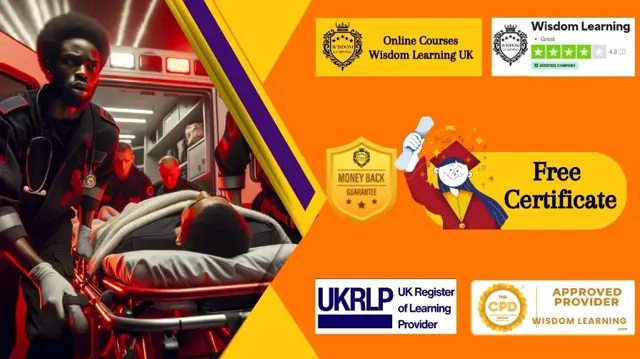
Emergency Paramedic Course
UKRLP & CPD approved provider | Easy Refund | Free e-Certificate | Instant Access | Tutor Support |
Wisdom Learning Limited
Summary
- Reed Courses Certificate of Completion - Free
- Tutor is available to students
Add to basket or enquire
Overview
Emergency Paramedic
The Emergency Paramedic Course offers a comprehensive pathway for individuals aspiring to become proficient paramedics within the UK healthcare system. Through 8 meticulously designed modules, participants delve into foundational principles, anatomy, pharmacology, emergency care, and specialised medical interventions. From mastering patient assessments to managing diverse emergencies and fostering effective communication, this Emergency Paramedic course equips learners with the expertise needed to navigate the demanding yet rewarding challenges of pre-hospital care. Ideal for aspiring paramedics, healthcare professionals seeking career advancement, and those transitioning into the field.
Key Features- Emergency Paramedic
This Emergency Paramedic includes the following offers:
- Emergency Paramedic - Instant Free Certificates
- Self-paced learning
- 24/7 Support
Enrol on our Emergency Paramedic course to gain a comprehensive understanding of Emergency Paramedic.
Curriculum
-
Module 1: Foundations of Paramedic Practice 08:00
-
Module 2: Anatomy, Physiology, and Pathophysiology 07:00
-
Module 3: Pharmacology for Paramedics 05:00
-
Module 4: Emergency Care and Trauma Management 05:00
-
Module 5: Special Populations and Medical Conditions 05:00
-
Module 6: Advanced Medical Techniques 05:00
-
Module 7: Mental Health and Psychological First Aid 05:00
-
Module 8: Leadership, Teamwork, and Continuous Learning 04:00
-
Quiz 04:00
Course media
Description
Emergency Paramedic Course: Learning Outcomes
Upon completion of the Emergency Paramedic course, participants will:
Demonstrate comprehensive understanding. Develop a thorough understanding of paramedicine, including its role within the UK healthcare system, ethical considerations, and legal responsibilities in pre-hospital care.
Exhibit professionalism and effective communication: Display professionalism, ethical conduct, and effective communication skills essential for building trust with patients, colleagues, and other healthcare professionals.
Conduct accurate patient assessments: Master techniques for conducting thorough patient assessments, including history taking, physical examinations, and vital sign monitoring, to formulate appropriate treatment plans.
Apply knowledge of anatomy, physiology, and pathophysiology: Apply knowledge of human anatomy, physiology, and pathophysiology to assess and manage various medical and traumatic emergencies effectively.
Administer medications safely and effectively: Understand pharmacokinetics, pharmacodynamics, and drug administration techniques to administer medications safely and effectively, including pain management, allergy treatment, and management of common medical conditions.
Manage cardiac and respiratory emergencies: Demonstrate proficiency in advanced cardiac life support (ACLS), including ECG interpretation, as well as respiratory emergency management and advanced airway techniques.
Provide specialised care to diverse populations: Develop competence in managing maternal, paediatric, and geriatric emergencies, as well as chronic medical conditions, with sensitivity to the unique needs of each population group.
Perform advanced medical interventions: Acquire skills in advanced medical interventions such as intubation, supraglottic airway management, and management of medical emergencies such as seizures, diabetic crises, and anaphylaxis.
Recognise and manage mental health crises: Develop the ability to recognise and manage mental health crises effectively, including the application of psychological first aid and communication strategies.
Demonstrate effective leadership and teamwork: cultivate skills in effective leadership, teamwork, and decision-making under pressure, essential for coordinating emergency responses and ensuring optimal patient care outcomes.
Commit to lifelong learning and professional development: recognise the importance of continuous learning, staying updated with advancements in paramedic practice, and actively engaging in professional development activities to enhance skills and knowledge.
How This Course Can Help (UK)
Completing the Emergency Paramedic course can provide numerous benefits for individuals seeking to pursue a career in paramedicine within the UK:
Career advancement
Meeting regulatory requirements
Enhanced job prospects
Professional development
Contribution to public health
Emergency Paramedic Certificate
Upon completing the Emergency Paramedic Course, you will receive an instant Emergency Paramedic certificate from Reed.
Who is this course for?
The Emergency Paramedic Course is designed for individuals seeking to pursue a career as a paramedic within the UK healthcare system. It is suitable for:
- Aspiring paramedics are looking to acquire the necessary knowledge, skills, required for entry into the profession.
- Qualified healthcare professionals, such as nurses or ambulance technicians, seeking to enhance their skills and advance their career in pre-hospital care.
- Individuals currently working in related fields who wish to transition into a paramedic role and broaden their scope of practice.
Requirements
Emergency Paramedic
- Learners with no prior Emergency Paramedic knowledge may enrol in this Emergency Paramedic course.
- This Emergency Paramedic course has no requirements.
Career path
Emergency Paramedic
EMERGENCY PARAMEDIC course offers a unique opportunity to gain valuable skills and advance your career
Questions and answers
Currently there are no Q&As for this course. Be the first to ask a question.
Certificates
Reed Courses Certificate of Completion
Digital certificate - Included
Will be downloadable when all lectures have been completed.
Reviews
Currently there are no reviews for this course. Be the first to leave a review.
Legal information
This course is advertised on reed.co.uk by the Course Provider, whose terms and conditions apply. Purchases are made directly from the Course Provider, and as such, content and materials are supplied by the Course Provider directly. Reed is acting as agent and not reseller in relation to this course. Reed's only responsibility is to facilitate your payment for the course. It is your responsibility to review and agree to the Course Provider's terms and conditions and satisfy yourself as to the suitability of the course you intend to purchase. Reed will not have any responsibility for the content of the course and/or associated materials.


